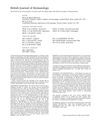119 citations,
February 2009 in “Neuroscience & Biobehavioral Reviews” Trichotillomania involves hair pulling and can be treated with therapy and medication.
 30 citations,
August 2018 in “Dermatology and Therapy”
30 citations,
August 2018 in “Dermatology and Therapy” Better-designed, long-term studies are needed to optimize treatment for trichotillomania and trichophagia.
 27 citations,
January 1990 in “Child Psychiatry & Human Development”
27 citations,
January 1990 in “Child Psychiatry & Human Development” The document concludes that supportive home environments and addressing parent-child interactions can effectively treat trichotillomania in children.
 20 citations,
August 2018 in “Clinics in Dermatology”
20 citations,
August 2018 in “Clinics in Dermatology” The conclusion is that understanding and addressing the psychological effects of alopecia areata is important for effective treatment.
 20 citations,
November 2012 in “Journal der Deutschen Dermatologischen Gesellschaft”
20 citations,
November 2012 in “Journal der Deutschen Dermatologischen Gesellschaft” Hair diseases can have psychological effects and should be treated with a combination of psychosomatic care, therapy, and medication.
 18 citations,
November 2000 in “British Journal of Dermatology”
18 citations,
November 2000 in “British Journal of Dermatology” Many skin patients have mental health issues, so dermatologists should consider psychological care.
 15 citations,
September 2015 in “Journal der Deutschen Dermatologischen Gesellschaft”
15 citations,
September 2015 in “Journal der Deutschen Dermatologischen Gesellschaft” Skin doctors should recognize and treat conditions like hair-pulling and skin-picking early, often using therapy and medication, to help 50-70% of patients.
11 citations,
January 2013 in “International Journal of Trichology” Emotional factors are crucial in treating and preventing scalp neurodermatitis and hair loss.
 6 citations,
May 1993 in “Archives of Disease in Childhood”
6 citations,
May 1993 in “Archives of Disease in Childhood” Children's hair loss can be caused by many factors, including autoimmune diseases, emotional stress, genetics, and infections, with treatment and prognosis varying.
4 citations,
January 2020 in “Indian dermatology online journal” Lichen simplex chronicus on the scalp can be diagnosed by specific hair and skin signs and treated with corticosteroids and therapy.
 4 citations,
September 2016 in “Journal der Deutschen Dermatologischen Gesellschaft”
4 citations,
September 2016 in “Journal der Deutschen Dermatologischen Gesellschaft” Some skin patients have body image issues linked to social difficulties but want psychological help.
1 citations,
April 2022 in “Journal of Cosmetic Dermatology” Androgenetic alopecia causes significant psychological distress, especially in women, and requires both medical and psychological support.
 1 citations,
May 2003 in “Archives of Pathology & Laboratory Medicine”
1 citations,
May 2003 in “Archives of Pathology & Laboratory Medicine” The boy had trichotillomania, causing hair loss, and treatment focused on habit reversal and support.
January 2022 in “Clinical Cases in Dermatology” The girl's hair loss is due to trichotillomania, which may improve with behavioral therapy or a combination of treatments.
 December 2019 in “Pediatria i Medycyna Rodzinna”
December 2019 in “Pediatria i Medycyna Rodzinna” Alopecia areata is a hair loss condition that may be linked to stress and genetics, often requires psychological support, and has no set treatment.
 January 2012 in “International Journal of Trichology”
January 2012 in “International Journal of Trichology” Psychological factors significantly affect hair health, suggesting a need for integrating mental health care in treating hair loss.
 January 2009 in “Springer eBooks”
January 2009 in “Springer eBooks” The document concludes that treating skin conditions should include psychological care and a multidisciplinary approach is essential for effective management.
 November 1999 in “Australian Psychologist”
November 1999 in “Australian Psychologist” The reviews highlighted practical advice and insights from various psychology and therapy books.
 855 citations,
June 2009 in “The Journal of Clinical Endocrinology & Metabolism”
855 citations,
June 2009 in “The Journal of Clinical Endocrinology & Metabolism” The guideline recommends mental health involvement in diagnosing gender identity disorder and outlines hormone and surgical treatment protocols, emphasizing safety, informed consent, and long-term monitoring.
 284 citations,
November 1999 in “Neurology”
284 citations,
November 1999 in “Neurology” The article suggests managing interferon beta therapy side effects in MS with dose adjustments, medications, and patient education.
 38 citations,
April 2017 in “Journal of The American Academy of Dermatology”
38 citations,
April 2017 in “Journal of The American Academy of Dermatology” Many skin patients have mental health issues, but few dermatologists are well-versed in treating these conditions.
 31 citations,
November 2000 in “Journal of the European Academy of Dermatology and Venereology”
31 citations,
November 2000 in “Journal of the European Academy of Dermatology and Venereology” Skin problems can be linked to sexual abuse, requiring careful medical and psychological evaluation.
 17 citations,
June 2018 in “Sexual Medicine Reviews”
17 citations,
June 2018 in “Sexual Medicine Reviews” The document concludes that non-operative treatment for gender dysphoria is safe and effective, and hormone therapy does not increase cancer risk.
 14 citations,
December 2007 in “Journal of The European Academy of Dermatology and Venereology”
14 citations,
December 2007 in “Journal of The European Academy of Dermatology and Venereology” The article concludes that dermatologists should prescribe lifestyle drugs carefully and consider mental health treatments for patients with disorders like BDD.
 1 citations,
July 2013 in “JAMA Dermatology”
1 citations,
July 2013 in “JAMA Dermatology” Dermatologists should address erectile dysfunction in patients with skin conditions to improve their quality of life.
 November 2024 in “Frontiers in Medicine”
November 2024 in “Frontiers in Medicine” Cirrhosis affects quality of life with various symptoms, requiring a holistic, multidisciplinary approach for management.
 February 2024 in “Sohag Medical Journal”
February 2024 in “Sohag Medical Journal” Various local treatments for alopecia areata show promise, but individualized plans and more research are needed.
 May 2012 in “The journal of nervous and mental disease”
May 2012 in “The journal of nervous and mental disease” The book provides comprehensive information on Impulse Control Disorders but lacks definitive evidence for effective treatments.
17 citations,
August 2018 in “Clinics in Dermatology” Skin and hair-picking disorders are common and need both skin and mental health treatments.
17 citations,
January 1984 in “Psychotherapy and psychosomatics” Antiandrogen treatment can reduce sexual enjoyment in women with excess male hormones, especially those in stable relationships.






















